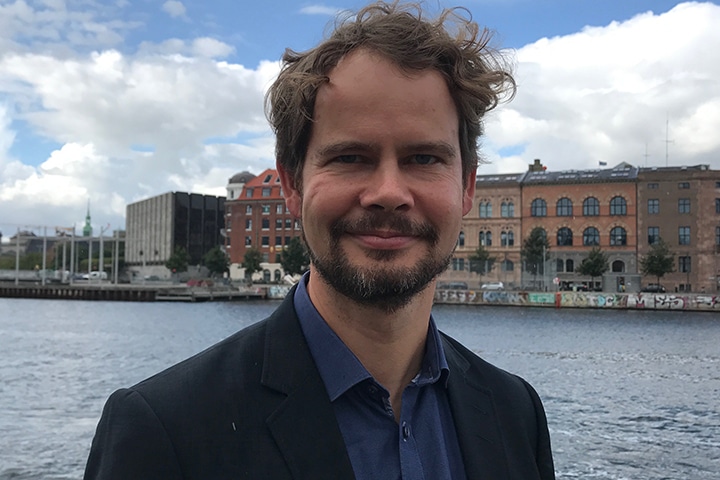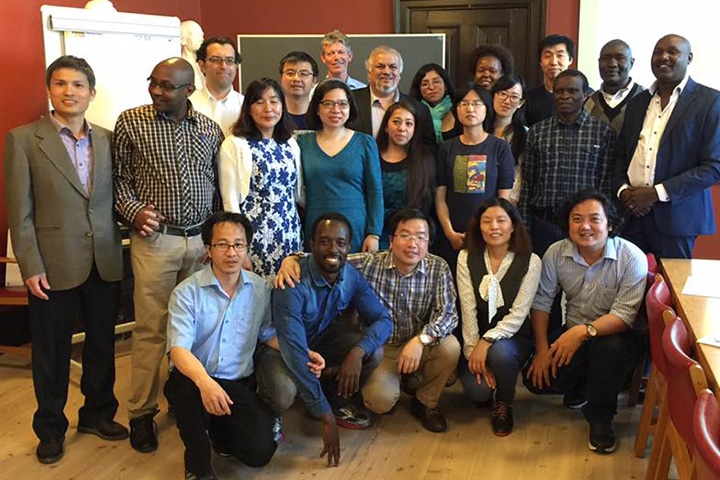Danida Fellowship Centre offers useful tools to Denmark’s bilateral engagements
27-09-17

Jakob Haugaard, Chief Advisor and Coordinator of the Strategic Sector Cooperation Facility, Photo: Vibeke Quaade
The two-year-old Strategic Sector Cooperation Facility anchored in Danish Ministry of Foreign Affairs is here to stay. Danida Fellowship Centre plays a key role in its implementation, says Jakob Haugaard, the newly appointed Chief Advisor and Coordinator of the Strategic Sector Cooperation Facility.
By Vibeke Quaade
It started in January 2015 with 12 partner countries in Africa, Asia and Latin America, more than 10 different Danish partner authorities and 17 Sector Counsellors based in partner countries. It has now been expanded with new strategic sector cooperation projects and Sector Counsellors in countries such as China, India and Iran, and new Danish authorities, including Aarhus and Copenhagen Municipality. The Strategic Sector Cooperation facility (also termed Partnering with Denmark facility) supports sector partnerships in emerging and growth countries with the threefold goal of helping to strengthen organizational capacity and framework conditions in partner countries to support the fulfilment of prioritized SDGs, strengthening and expanding bilateral relations with the partner country, and improving opportunities for Danish companies to expand their engagement with the partner country. Danida Fellowship Centre plays a key role in supporting the initiative.
The new scholarship programme
Last year, the Ministry of Foreign Affairs mandated the Danida Fellowship Centre to offer learning courses and programmes under the Strategic Sector Cooperation Facility. The first course was held in the spring of 2017. By the end of 2017, more than 150 scholarships for more than 15 new tailor-made courses or degree programmes at Danish universities will have been granted for partners from 8 partner countries through DFC’s scholarship programme.

One Health course participants, Photo: Anders Dalsgaard
The first tailor-made course, “One Health” , concluded in June. Twenty two participants from the veterinary and food sectors in Vietnam, China, Kenya, Colombia and Mexico attended the three-month course at the University of Copenhagen.
The response was very positive. The participants came back with concrete and relevant learning points fitting their specific contexts. The experience serves as a stepping stone for further collaboration, says Jakob Haugaard, the Chief Advisor and Coordinator of the Strategic Sector Cooperation Facility since August 2017.

The flexible approach is the best
Jakob Haugaard is certain that the Danida Fellowship Centre plays an important role in advancing the agenda of the Strategic Sector Cooperation Facility, noting that political support for the facility and for linking it with the DFC scholarship programme, has been very strong. The feedback he has received so far from the Sector Counsellors in the partner countries has also been very positive.
The Sector Counsellors see clear benefits from their collaboration with the Danida Fellowship Centre. They have a new instrument in their toolbox. They can engage with their partners and different authorities and invite them to Denmark to participate in a post-graduate course or in a three week or three month learning course depending on their needs and the time available, he says. He emphasizes that the flexible approach to planning the course content and learning methodology is a key factor in its success, as it allows both Growth Counsellors and Danish university partners to inform the content.
The best part is that the Sector Counsellors have the opportunity to be involved in the development of the courses thereby making sure that they suit the particular needs of each partner. One-size-fits-all courses would not be as effective as the flexible approach, Jakob Haugaard says.
Research grants
Besides the scholarship programme the Danida Fellowship Centre manages the research grants allocated to research projects related to the thematic areas and partner countries under the Strategic Sector Cooperation Facility.

The first call for research proposals under the Strategic Sector Cooperation Facility was made in 2017 and the first research grants will be allocated towards the end of the year. According to Jakob Haugaard, the research grants and projects have the potential to be of significant importance to the Strategic Sector Cooperation Facility and Denmark’s collaboration with growth and transition countries under the facility.
Prior to taking up his new role as coordinator, Jakob Haugaard served as Deputy Head of Mission at the Danish Embassy in Bangladesh. He refers to a research project from his time in Bangladesh entitled “Enhancement of Occupational Safety – The impact of CSR in Bangladesh’s Garment Sector”. It studied the linkages between occupational safety and health in the textile sector and provided important input to complement the Embassy’s work on improving occupational safety and health in the Bangladeshi textile sector.
The research project helped the Growth Counsellor in Bangladesh get through to the main stakeholders of the textile industry with the message that investing in the safety of the workers not only makes sense for the sake of living up to the law. It is also profitable because the productivity of the workers increases as a result of their improved conditions, he says.
Deeper international engagement
Jakob Haugaard is sure that the Strategic Sector Cooperation Facility is here to stay, and explains that one of the main advantages of the facility is the involvement of Danish line ministries.
The technical knowhow and expertise of the line ministries make the projects under the facility action-oriented and tangible and therefore of interest to both the partnering countries and Denmark in terms of knowledge sharing and business collaboration.
Let us take China and Indonesia as an example. They are eager to engage in technical cooperation with Denmark in areas such as energy efficiency, renewable energy and urban planning. The Strategic Sector Cooperation Facility honors that need, says Jakob Haugaard.
He foresees that the Danida Fellowship Centre, with its many years of experience, could play a role in supporting Danish authorities as they implement new projects with their partners, in terms of good practices and approaches in capacity development, and in identifying partner needs and carrying out capacity development activities.
The Danida Fellowship Centre has ample experience in developing the kind of courses we need and in hosting government officials and technical professionals from abroad. It makes sense to draw from these experiences, he says.
The Danida grants for research in growth and transition countries
The Ministry of Foreign Affairs of Denmark (MFA) provides grants for development research activities as part of Denmark’s international development cooperation. The Danida Fellowship Centre (DFC) administers the MFA’s support to development research.
Two windows have been set up for 2017, providing grants for research with partners in Danida priority countries (Window 1) and for research with partners in growth and transition countries (Window 2). The total budget available for Window 2 is approximately DKK 60 million. The duration of projects is 18 to 36 months with a maximum grant of DKK 5 million for each project. These initial research projects are considered to be pilot projects.
The first round of applications is ongoing. Twenty Window 2 applications were prequalified, see here. The final selection by the Ministry of Foreign Affairs will take place late in 2017 with project starts in 2018.
A new round of applications will be announced in November 2017 on the DFC website.
Queries regarding application procedures should be directed to DFC at research@dfcentre.dk.
Go back to our stories